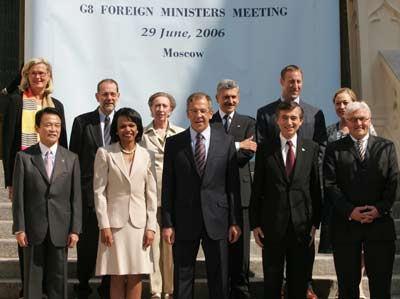Foreign ministers from the G8 leading industrialized countries discussed on
Thursday how to persuade Iran to respond quickly to proposals aimed at defusing
a crisis over it nuclear program, an EU official said.

Japanese Foreign
Minister Taro Aso, U.S. Secretary of State Condoleezza Rice, Russian
Foreign Minister Sergei Lavrov, French Foreign Minister Philippe
Douste-Blazy, German Foreign Minister Frank-Walter Steinmeier, (Rear row
from L) Austrian Foreign Minister Ursula Plassnik, European Union Foreign
Policy Chief Javier Solana, Foreign and Commonwealth Affairs Secretary
Margaret Beckett, Italian Foreign Minister Massimo D'Alema, Canadian
Foreign Minister Peter Mackay and EU External Relations Commissioner
Benita Ferrero-Walder pose for a family picture during the G8 Foreign
Minister Summit in Moscow, June 29, 2006.
[Reuters] |
Iran has still not said whether it will accept a package of incentives handed
to Iran on June 6 by the five permanent, veto-wielding U.N. Security Council
members - the United States, Britain, France, China and Russia - and Germany.
The United States has accused Iran of having a secret program to build
nuclear weapons. Tehran denies the charge, saying its nuclear program is solely
for power generation.
"We'll talk about the Iranian situation, I'm certain," U.S. Secretary of
State Condoleezza Rice told reporters. The Group of Eight talks in Moscow were
also attended by foreign ministers from Russia, Canada, France, Germany, Italy,
Japan and Britain.
An EU official with knowledge of the talks told Reuters that the initial
round of talks in a 19th century former merchant's mansion in central Moscow was
devoted to the wait for a response from Tehran and the next steps to take.
There has been disappointment at Iran's slow response to the package of
incentives put by six world powers. Tehran has said it will respond by August
22.
Talks on the incentives package are conditional on Iran freezing uranium
enrichment and answering questions about its program.
The foreign ministers were to discuss how best to persuade Iran to respond, a
G8 source who declined to be named said. The EU official confirmed that Iran's
response was the key issue.
But there were signs of possible divisions among Western powers after
Germany's defense minister said in an interview with Reuters that Iran should be
allowed to enrich uranium for power generation under close monitoring by U.N.
inspectors.
The United States, which along with Britain has argued for a long-term
suspension of uranium enrichment, contacted the German government to clarify the
comments. A German government spokesman said Berlin stood by the June 6 call for
a suspension of enrichment in order to enable talks.
Ahead of the G8 talks the British, French and German ministers -- the
so-called "EU3" who spearhead European diplomacy on Iran - held separate talks
with EU foreign policy chief Javier Solana.
The United States and the European Union have called for an Iranian reply in
"weeks, not months" and suggested they would like a response before a summit of
G8 leaders on July 15-17.
Russia, which has signed up to the incentive package but supports Tehran
having a civilian nuclear program, is unlikely to want to see the July summit
overshadowed by Iran.
The Kremlin is pushing for energy security to be the main topic at the summit
in Russia's second city of St Petersburg.
The United States, the European Union, Russia and China have warned Iran the
U.N. Security Council will act if it does not suspend uranium enrichment.
But they have set no deadline and Moscow and Beijing oppose
sanctions.